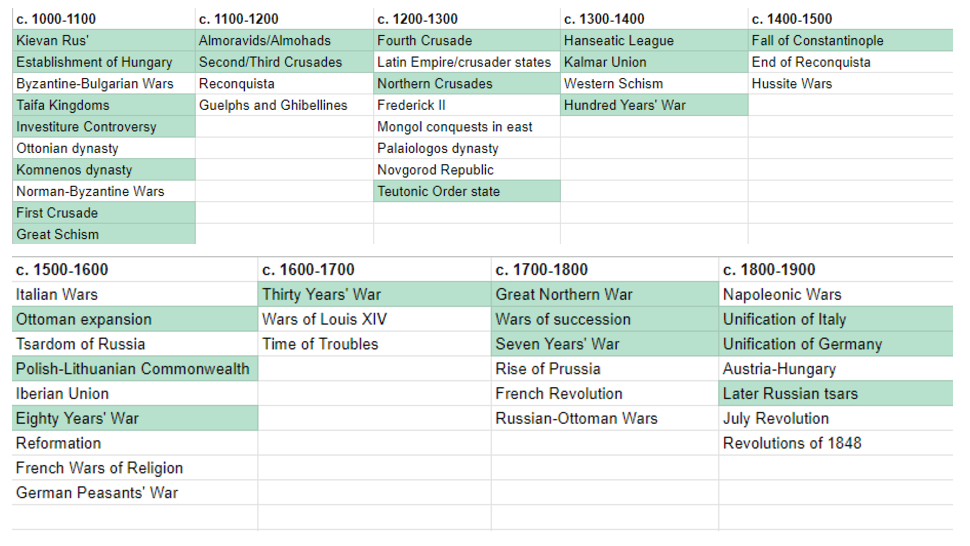Introduction
To begin with, I’d like to give a brief overview of how I got into history - probably unlike lots of other specialists, I started from a very low baseline level before beginning to play quizbowl. I am keen to reassure novice and intermediate players not to worry if you aren’t starting off with tons of prior knowledge under your belt; starting off in this situation and eventually ending up playing as a specialist on your university’s A team is absolutely doable. It’s important to not be discouraged by repeatedly encountering things you don’t know; even the very best players have gaps in knowledge, and every new clue you hear is something that could get you points in the future.
Before my second year of doing quizbowl, I knew almost no history outside of the very limited amount I learnt in school. In first year, I remember seeing a University Challenge picture round asking for several empires whose territory overlapped with that of modern-day Iran (they asked for the Parthians, Abbasids, Safavids and Seleucids) and not having heard of any of the answers. Over the summer I happened to come across a recommendation for Mike Duncan’s The History of Rome podcast, which I enjoyed a lot. While I have acquired an interest in many periods of history over time, I believe this is what set me on the road to be especially focused on ancient history in particular.
A few months after that I realised I still hadn’t learnt much yet, and I decided to start actively learning the basics and working towards being able to get history questions in quizbowl; this is what my section of this article is all about. I read ancient primary sources and more general books, listened to podcasts for countless hours, and wrote questions about new topics I encountered.
History is now an interest I deeply value for its own sake, and I am sure I would never have gotten into it without the exposure to fun new things I acquired from playing quiz. If you’re looking at exploring new interests, I hope quizbowl can do the same for you.
Getting Started
It can initially be intimidating starting to learn a quizbowl category that you wouldn’t have previously considered a specialism of yours. I would highly recommend starting by focusing on the specific areas that you first became interested in, because quiz is supposed to be fun, and you will always remember things you learn in your favourite topics better than others.
Once you want to branch out in quizbowl, you should familiarise yourself with the “canon”, meaning the topics that are asked about often. Below are screenshots from a spreadsheet I made in March 2022, around the time I was getting started; this contains a number of European History topics I wanted to learn about, with rough temporal categorisations. This is obviously not exhaustive, but I obtained the list by writing down things that came up in practices and tournaments which I had vaguely heard of through quiz, but didn’t know much detail about. This is an effective way of gaining a grounding from which to branch out into learning more in-depth knowledge.

YouTube playlists such as the Crash Course series are good for getting a sense of the chronology— I watched the “Crash Course European History” series for a broad post-1450 overview. Inevitably, a chronological series like these can’t cover everything on its own; it makes sense to both do deeper dives into topics you find interesting (by reading books and online articles, or watching videos and listening to podcasts) and play more quizbowl, from which you can fill in the gaps when topics you haven’t already encountered come up.
Another thing I found helpful was making PowerPoint quizzes that would either ask for a year in which a map (from a YouTube screenshot) would be accurate, or ask the player to fill in the names of missing polities and rulers. This is useful because narrowing clues down temporally is very important to be able to do quickly at game speed. It becomes essential to know roughly when most famous rulers were around (specific dates of reigns are often unneeded). For example, if a question mentions Matthias Corvinus, you need to immediately recognise it is in the mid-to-late 15th century, and think about what else was going on at the time, but memorising the exact years 1458 to 1490 is not so important for quizbowl. I wouldn’t recommend trying to rote-learn dates; if you engage frequently with history then you will just pick up a good sense of when things happened by familiarity, but be aware that it may take some time to become comfortable with this when you are first starting out.
Moving to Higher Levels
In addition to just continuing to learn about what you are interested in, my two biggest tips for improving at history at higher levels are a) writing questions and b) (mostly for ancient history) having a look at some primary sources.
It’s very easy to hear or read about a fact in passing and then forget it (and then possibly be very annoyed at yourself when it comes up later in quiz). A good way of really making things stick is to write your own tossups or bonuses on interesting topics you find out about. Reading through your questions over and over again while writing will get you to remember the clues very well; occasionally a writer for a future tournament may have a similar idea for a question to you, and you’ll get it very early.
Primary sources for ancient history are both a lot of fun to read, and get clued from directly in quizbowl much more than other historical periods. Sources like Herodotus’ Histories and Plutarch’s Parallel Lives are full of interesting and memorable anecdotes that often come up as early clues in tossups. Other sources for ancient Greek history that are well worth reading include Thucydides’ History of the Peloponnesian War (which contains famous speeches and discourses like Pericles’ funeral oration, the Mytilenean Debate, and the Melian Dialogue), Xenophon’s Hellenica and Anabasis (respectively covering the period from 411 to 362 BC, and the March of the Ten Thousand), and the works of Diodorus Siculus and Polybius.

